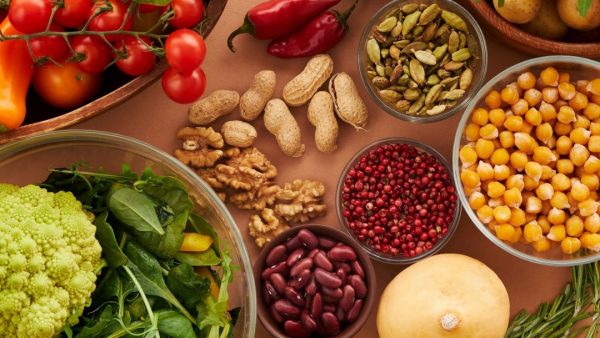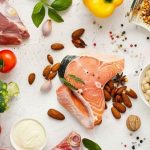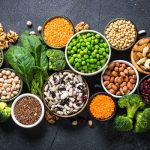When most people think of protein sources, their first thoughts generally run toward poultry, beef and other meat sources. Next on the list are things like eggs, milk and cheese; again from animal sources.
Plant-based protein sources, like nuts or beans are never high on the list. For most folks, they aren’t even on the list!
Well, guess what? It turns out that people who eat higher amounts of plant-based protein have a greater likelihood of healthy aging compared to those who get most of their protein from animal sources.
New data from the long-running Nurses’ Health Study shows that when women replace meat or dairy protein with plant-based protein, they are more likely to experience good physical function, good mental health and an absence of chronic disease in later years.
More specifically…
- 7.6% of participants achieved completely healthy aging.
- 31% remained free of any of the 11 chronic diseases examined.
- 15% developed no physical function limitations.
- 47.6% reported no memory impairments.
- 37.3% reported good mental status.
While this specific analysis focused on women with higher plant-based protein intake in middle-age, it supports previous research that shows how important non-animal protein is for healthy aging among both men and women in older adulthood.
Protein Does a Body Good
Protein helps build strong bones, muscle skin and hair. It is required to repair damaged tissue and carry oxygen throughout your body. It aids digestion and has an important role in the regulation of hormones.
So protein is definitely an important part of your diet. But there is a problem…
About one in every three men and 45% of women between 51 and 60 years of age fall well below recommended levels of protein intake. And the numbers only get worse for people in their 70’s and 80’s.
To top it off, your ability to synthesize protein declines with age. So if you’re not eating enough to start with, this becomes a double whammy to your physical well-being.
However, you can curtail this loss by boosting your protein intake and eating it at regular intervals throughout the day. As a matter of fact, people who evenly distribute protein intake across their daily meals have greater muscle strength and physical performance.
But remember! It’s the plant proteins that that will help you age well.
Best Plant-Based Protein Sources
My personal favorite plant-based sources of protein are beans, peas and lentils. These are all low-fat sources of protein and fiber, so they aren’t fattening. Put them in soups, make bean dip, use them to top your salads or make your own chickpea hummus.
And nuts… I love nuts! I eat a handful of nuts every single night. And there are so many different types of high-protein nuts to choose from; almonds, pistachios, walnuts and more.
Seeds, too. There is a lot of energy and protein in seeds. After all, a seed has to grow a whole new plant, right? Toss them into your yogurt. Blend them into smoothies. Use them to top your salads and veggies. (By the way, did you know that while quinoa, amaranth and buckwheat are officially classified as whole grains, they are really seeds?)
And, of course, there is always tofu. But tofu is not your only soy-based option.
Other soy-based proteins include edamame and tempeh. Edamame are immature soybeans that are steamed or boiled. Tempeh is made from cooked and slightly fermented soybeans. Once it’s fermented, it can be pressed into a patty or loaf, and then cooked. It’s grainier than tofu and has a nutty flavor. Like tofu, it absorbs flavor from sauces and spices.
There are even appreciable amounts of protein in vegetables like avocado, artichoke, broccoli, cauliflower and spinach.
Additionally, I often recommend my patients supplement with a plant-based protein powder they can mix into a shake. This is a quick and easy way to enhance your protein intake.
Ultimately, we need approximately 60-75 grams of protein daily, depending upon weight. Researchers recommend 1 to 1.2 grams of protein per kilogram body weight (one kilogram is about 2.2 pounds), preferably combined with some light resistance training each day for your muscles.
The exception to this rule is for those with poor kidney function. If your kidneys aren’t working well, which often occurs in later years, too much protein can be a problem.
Check with your doctor via a simple blood test to see if you’re getting enough, too much or not enough protein in your diet.
SOURCES:
Korat AVA, Shea MK, Jacques PF, et al. Dietary protein intake in midlife in relation to healthy aging – results from the prospective Nurses’ Health Study cohort. Am J Clin Nutr. Jan 2024. Open Access.
Ortolá R, Struijk EA, García-Esquinas E, Rodríguez-Artalejo F, Lopez-Garcia E. Changes in Dietary Intake of Animal and Vegetable Protein and Unhealthy Aging. Am J Med. 2020 Feb;133(2):231-239.e7.
Krok-Schoen J.L., et al. Low Dietary Protein Intakes and Associated Dietary Patterns and Functional Limitations in an Aging Population: A NHANES Analysis. J Nutr Health Aging. 2019;23(4):338-347.






